Trump impeachment trial: Senate votes no to witnesses, acquittal vote Wednesday
A report on John Bolton's new book hit as Friday's Senate session got underway
Senate votes 51-49 against allowing witnesses at Trump impeachment trial
The Democratic defeat comes even with a new Bolton bombshell
Final vote on acquittal set for Wednesday at 4 p.m.
Before Friday's session of President Donald Trump’s impeachment trial began, the spotlight was on four moderate GOP senators Democrats hoped would vote with them on allowing new witnesses, but by evening, after days of arguments meant to persuade the Republicans, Democrats had lost the crucial issue by a vote of 51-49.
A member of the Senate's GOP leadership, Sen. Roy Blunt, said a final vote on acquittal was set for 4 p.m. Wednesday, the day after Trump is scheduled to come to the Capitol to deliver his State of the Union Address. He had left the White House before the Friday vote headed for his Mar-a-Lago resort in Florida.
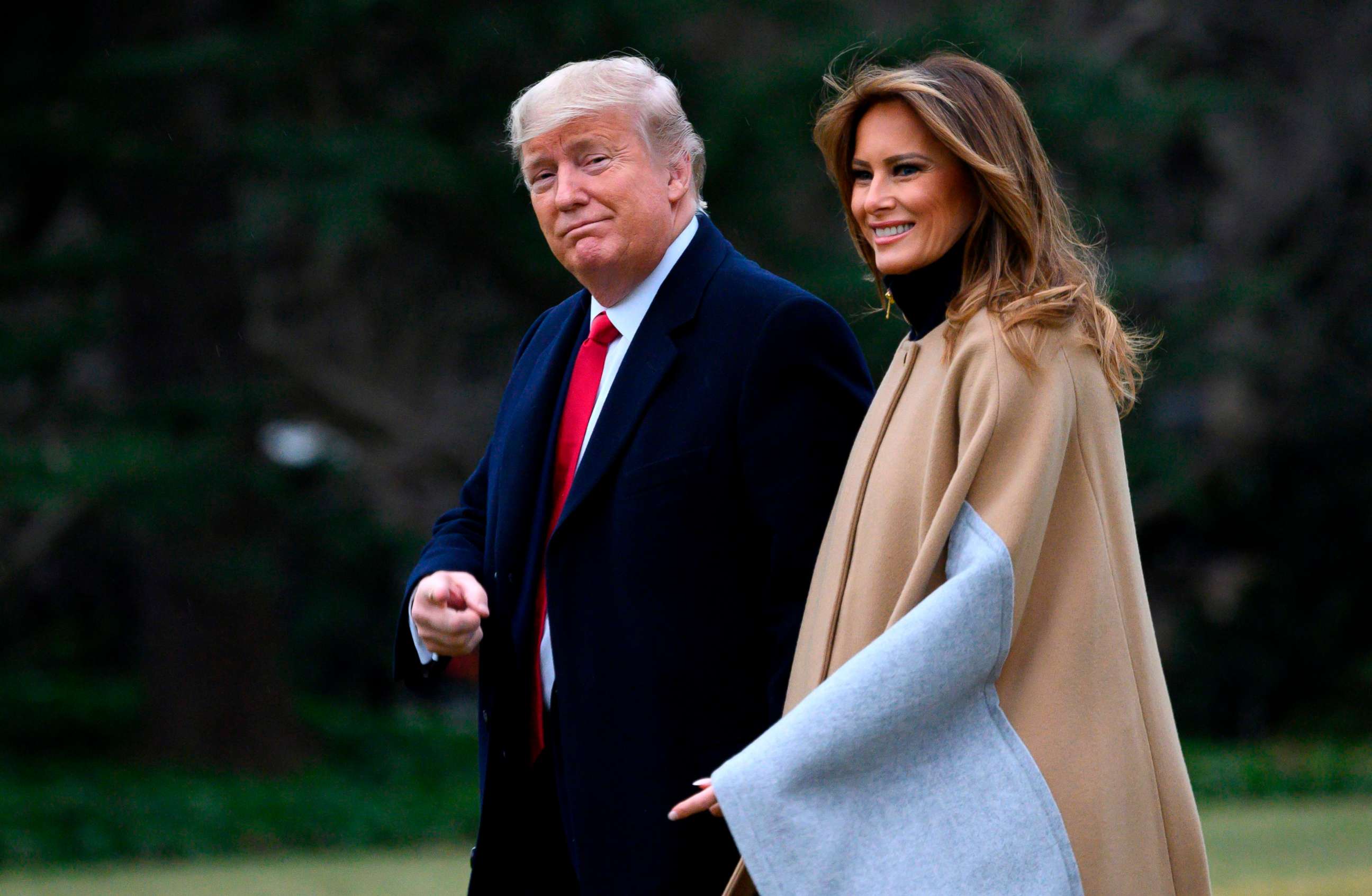
Democratic hopes for witnesses were dashed earlier in the day when Republican Sen. Lisa Murkowski, one of the targeted moderates, announced she would vote "no" just as Friday's Senate trial session was getting underway.
Democrats worked to sway her following revelations from former national security adviser John Bolton earlier in the week that seemed to undermine the president's defense.
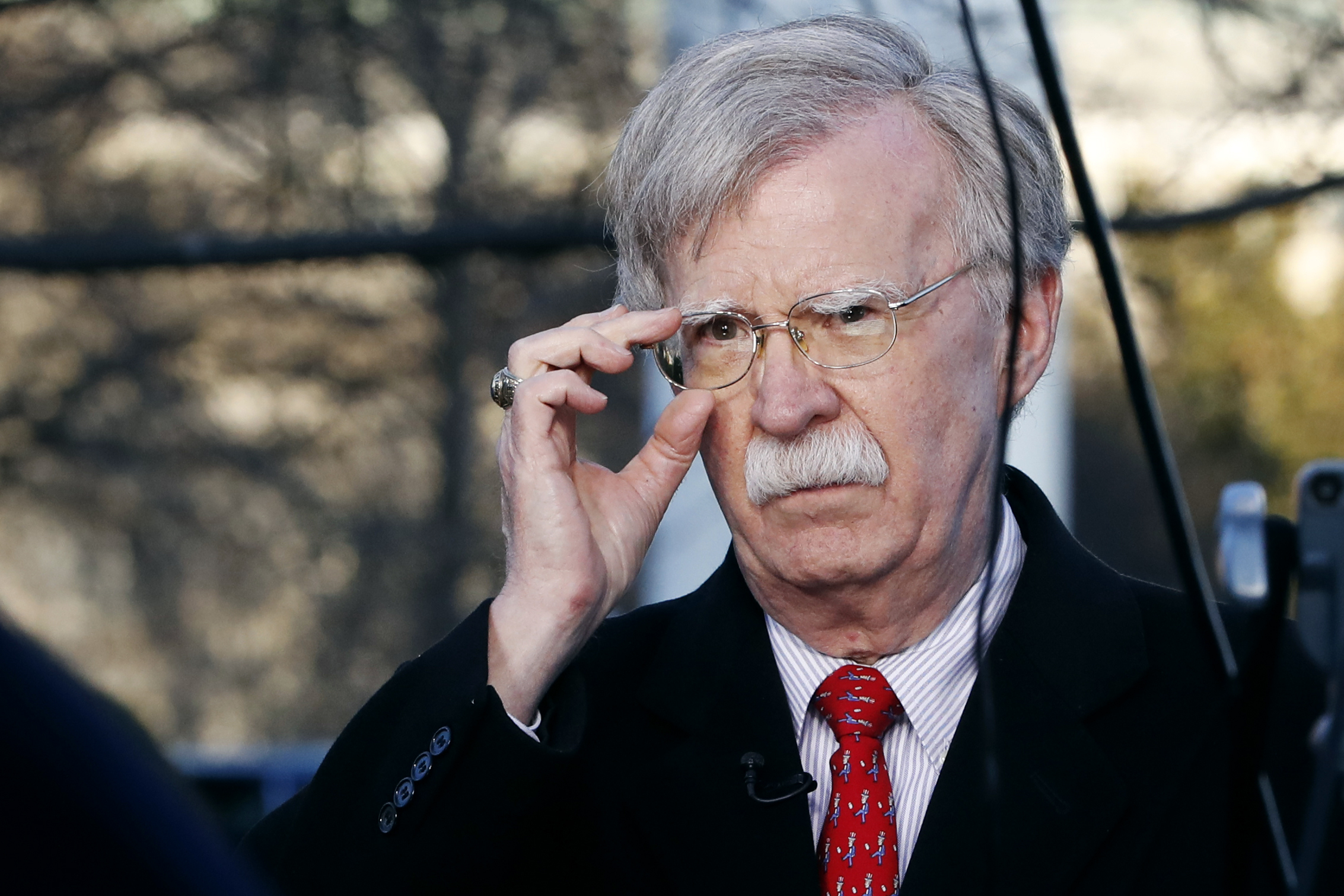
But Democrats ultimately failed, even though, just before her announcement and ahead of the start of the day's session, The New York Times published a new account of additional details from Bolton's book in which he says Trump directed him in May 2019 to help the president's personal lawyer, Rudy Giuliani, set up a meeting with Ukraine's president. If true, that would have been two months before Trump's controversial July 25 phone call with Volodymyr Zelenskiy -- a key issue in the trial.
Republicans had hoped to move to a final vote on whether to acquit the president shortly after the vote on witnesses -- but ABC News' John Parkinson reports Blunt said the Senate would continue voting on Democratic amendments to a resolution on next steps Friday night, then take off the weekend before returning Monday for closing arguments and a chance for senators pn Monday and Tuesday to explain their votes on the Senate floor.
The ABC News team of correspondents and producers has been covering every aspect of this story.
Here is how the day unfolded.
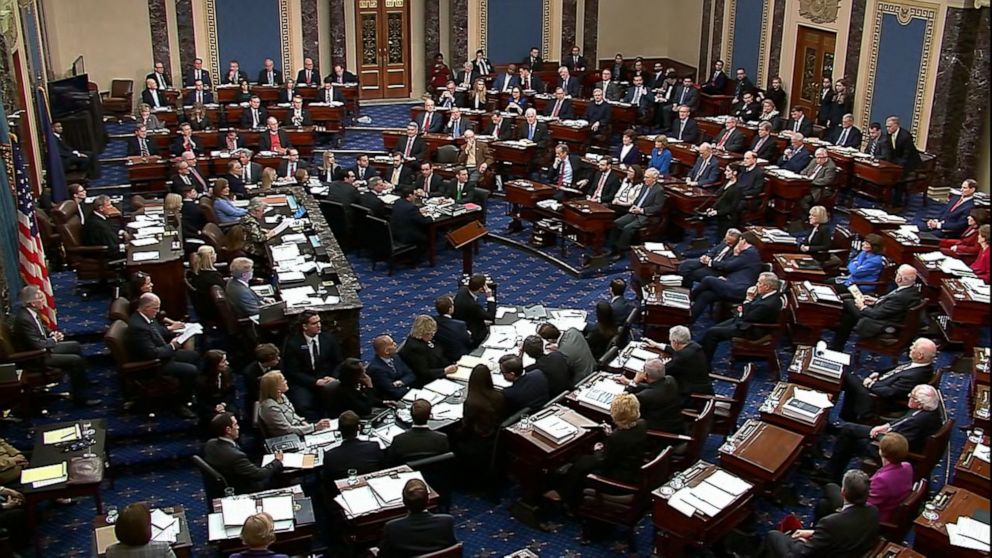
7:58 p.m. The Senate adjourns until Monday, Murkowski 'angry at all sides'
McConnell announces the Senate will return at 11 a.m. Monday when the trial will continue with closing arguments.
Senators head home for the weekend -- except Democratic presidential candidates who make a quick exit for Iowa ahead of Monday's caucuses.
GOP Sen. Lisa Murkowski tells reporters that she knows exactly how she will vote next Wednesday on the two articles of impeachment against President Trump - but she’s not announcing anything just yet.
“I’ve had so much drama today, I’m just gonna chill,” Murkowski says on her way out of the Capitol.
ABC News' Mariam Khan reports from the Capitol:
Asked about her ‘no’ vote on witnesses and what she would have considered to be a fair trial, she responds: “A fair trial would have been one where we could have remedied the defects that came out of the House. I think we got to a point where you just realize that [it] would never be sufficient to meet the demands of those who were seeking the results they wanted.”
“We started with a flawed product,” she says, adding, “I’m at that point where I'm frustrated and disappointed — angry at all sides.”
She says the possibility of Roberts having to vote in a potential tie break weighed “heavy” on her mind.
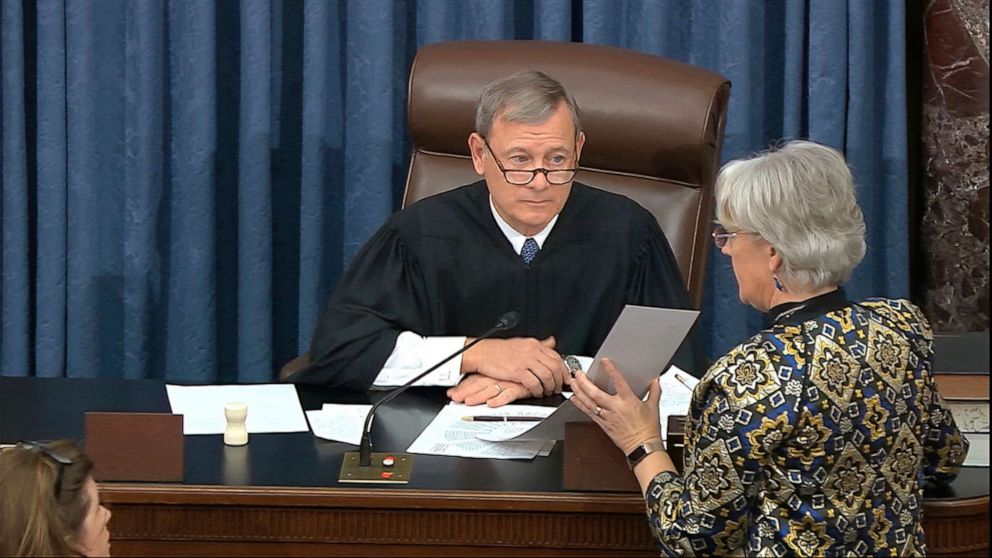
7:15 p.m. Roberts announces he won't cast tie-breaking votes
The Senate returns after a long break to vote on a series of Democratic amendments to a resolution on what happens next -- measures that would have the Senate pursue subpoenas for John Bolton and other key witnesses -- in order to get Republicans on the record voting against the idea. Democrats say they will pay a price with voters who polls showed were highly in favor of the Senate hearing witnesses at Trump's trial.
All the Democratic efforts are defeated.
Before those votes, in a moment that will go down in history, Minority Leader Schumer makes a parliamentary inquiry, asking Chief Justice John Roberts whether he would cast a tie-breaking vote.
"Is the chief justice aware that in the impeachment trial of President Johnson, Chief Justice Chase, as presiding officer, cast tie-breaking votes on both March 31st and April 2nd, 1868?" Schumer asks.
There have been lingering questions about how Roberts would handle a 50-50 vote on the question of witnesses, and any other matters, during the Trump impeachment trial, but he puts that notion to rest.
"I am Mr. Leader," Roberts replies. "The one concerned a motion to concern, the other to close deliberations."
He continues, "I do not regard those isolated episodes 150 years ago as sufficient to support a general authority to break ties. If the members of this body elected by the people and accountable to them divide equally on a motion, the normal rule is that the motion fails. I think it would be inappropriate for me, an unelected official from a different branch of government, to assert the power to change that result so that the motion would succeed."
-- ABC News' Benjamin Siegel
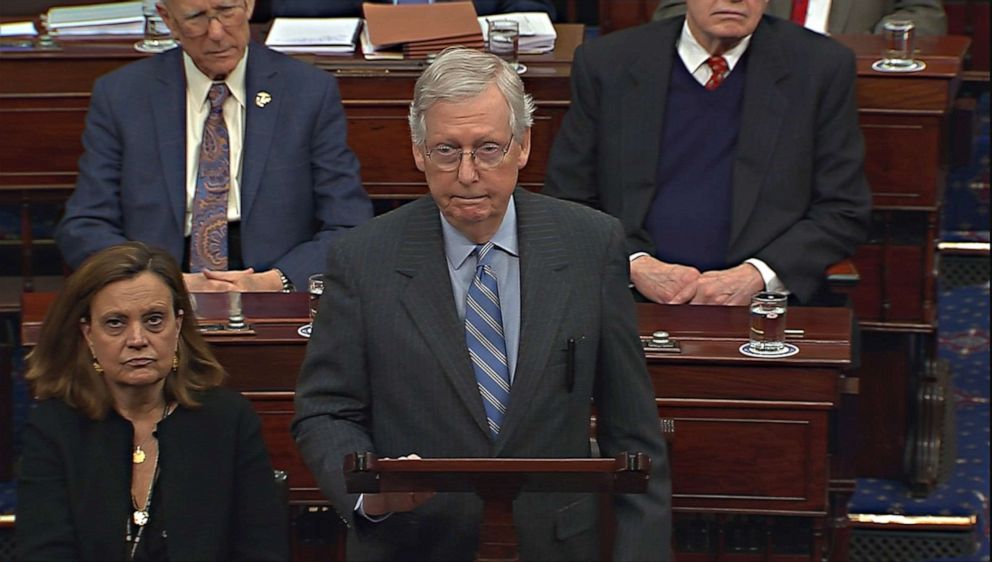
5:42 p.m. Senate defeats Democrats' effort to call new witnesses
As expected, by a vote of 51-49, Republicans defeat the Democrat's effort to call additional witnesses, and Majority Leader Mitch McConnell announces the Senate will be recess subject to a call of the chair.
It's unclear what the Senate will do next and when.
"To not allow a witness, a document - no witnesses, no documents - in an impeachment trial is a perfidy. It's a grand tragedy. One of the worst tragedies that the Senate has ever overcome,” an angry Minority Leader Chuck Schumer tells reporters after leaving the Senate chamber.
“America will remember this day, unfortunately, where the Senate did not live up to its responsibilities, where the Senate turned away from truth and went along with a sham trial,” he says.
“If the President is acquitted with no witnesses, no documents, the acquittal will have no value because Americans will know that this trial was not a real trial,” he says.
“It had no witnesses, no documents. It is a tragedy on a very large scale,” he says.
“I will be now going up to my caucus to discuss what we're doing next,” he says, before turning and walking away. He does not take any questions.
Following the vote McConnell issues a statement that indicates the trial will not be ending tonight or early Saturday as once thoughy.
"A majority of the U.S. Senate has determined that the numerous witnesses and 28,000-plus pages of documents already in evidence are sufficient to judge the House Managers’ accusations and end this impeachment trial," his statement reads.
"There is no need for the Senate to re-open the investigation which the House Democratic majority chose to conclude and which the Managers themselves continue to describe as “overwhelming” and “beyond any doubt.” Never in Senate history has this body paused an impeachment trial to pursue additional witnesses with unresolved questions of executive privilege that would require protracted litigation. We have no interest in establishing such a new precedent, particularly for individuals whom the House expressly chose not to pursue.
"Senators will now confer among ourselves, with the House Managers, and with the President’s counsel to determine next steps as we prepare to conclude the trial in the coming days," McConnell says.
--ABC News' Mariam Khan, Trish Turner and John Parkinson
5:36 p.m. Senate votes on allowing witnesses
After an extended break, the Senate begins voting Friday evening on the question of whether to call witnesses, all 100 senators announcing their votes while sitting at their desks as the clerk called the roll.
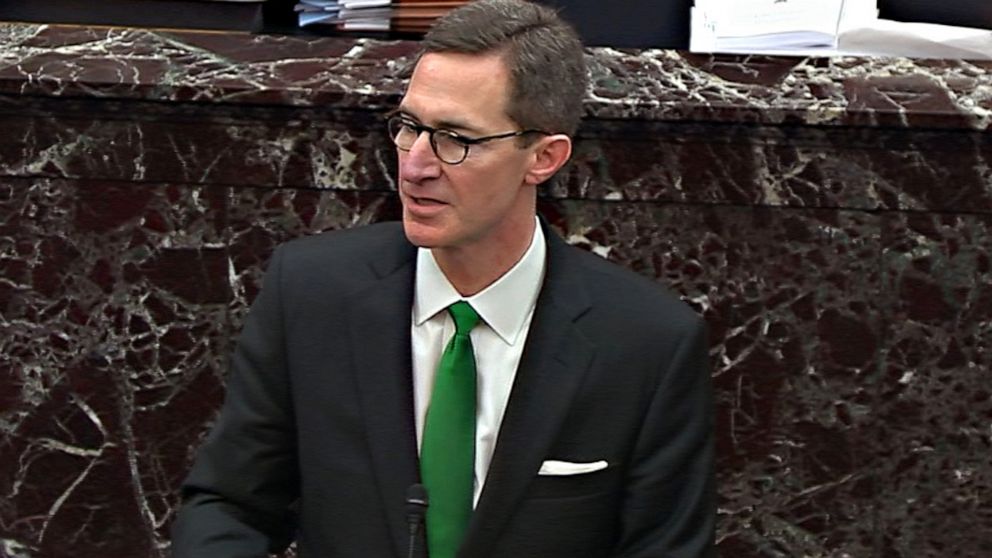
4:02 p.m. Trump lawyers: Witnesses not necessary because no impeachable offense
The president's defense team continues to argue that additional witnesses aren't necessary because the president's behavior doesn't warrant an impeachable offense.
Both White House deputy counsel Patrick Philbin and the president's personal attorney, Jay Sekulow, argue hearing from additional witnesses would be asking the Senate to do something the House should have done in its investigation.
Philbin argued the framers wanted the impeachment process in the Senate to be "swift" while the House handled the potentially slower investigation to present the case, something they allege Democrats' rushed because of the partisan nature of the charges against President Trump.
"That's all part of what makes this even more political especially in an election year. It's not the process that the framers had in mind," he said.
"I think it's very dangerous if the House runs up, which they did, articles of impeachment quickly, so quickly, that they are clamoring for evidence despite the fact that they put all of this evidence forward," Sekulow says.
They got their wish of an impeachment by Christmas that was their goal but now they want you to do the work they failed to do," he says.
Trump's legal team used just 27 minutes of their two hours allotted.
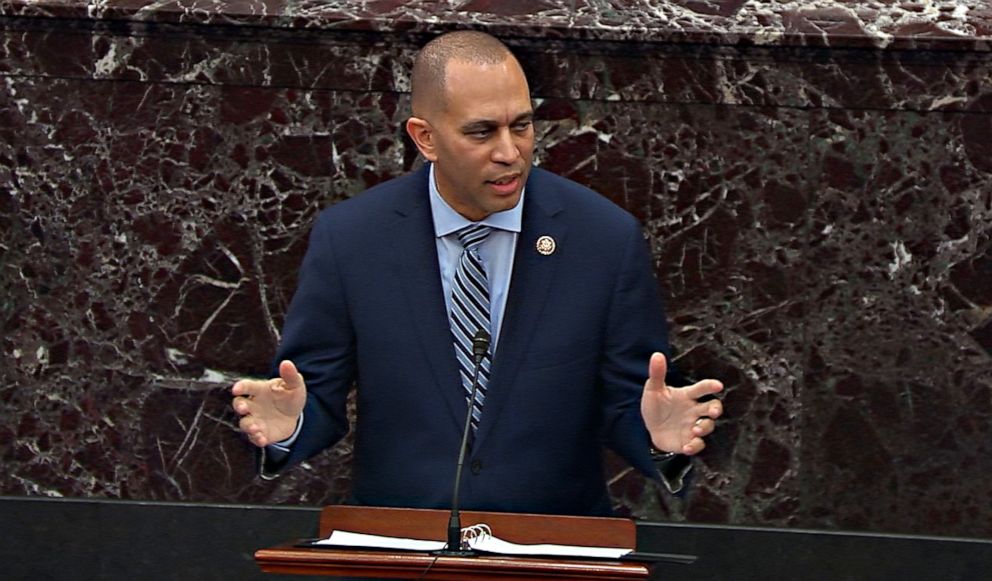
3:33 p.m. Jeffries: Mulvaney can give 'firsthand account'
House manager Hakeem Jeffries argued why acting White House Chief of Staff Mick Mulvaney’s testimony is “important” for the Senate to hear.
He says Mulvaney was in every meeting with Trump “at every stage of the scheme” and can give a “firsthand account for why the aid was withheld for the undisputed quid pro quo.”
“We just talked about motive and intent. Well if you want further insight into the president's motives or intent further direct evidence of why he withheld the military aid in the White House meeting, you should call his acting chief of staff who had more access than anyone. There’s only one way to find out let's all just question Mister Mulvaney under oath,” Jeffries says.
--ABC News' John Parkinson
3:19 p.m. Schumer: Don't want votes 'in the dark of night'
During a break Minority Leader Chuck Schumer says there is no agreement with Majority Leader Mitch McConnell on how to proceed in the final votes of the impeachment trial, casting some doubt on earlier expectations the Senate could vote on the articles late Friday night or even in the early hours of Saturday morning.
Schumer says they want all senators to have the chance to put their views and explain their vote on the record.
"We have stood for one thing, we do not want this rush through. We do not want it in the dark of night. Members have an obligation to tell the American people and to tell the people of their states why they are voting," he tells reporters.
--ABC News' Mariam Khan
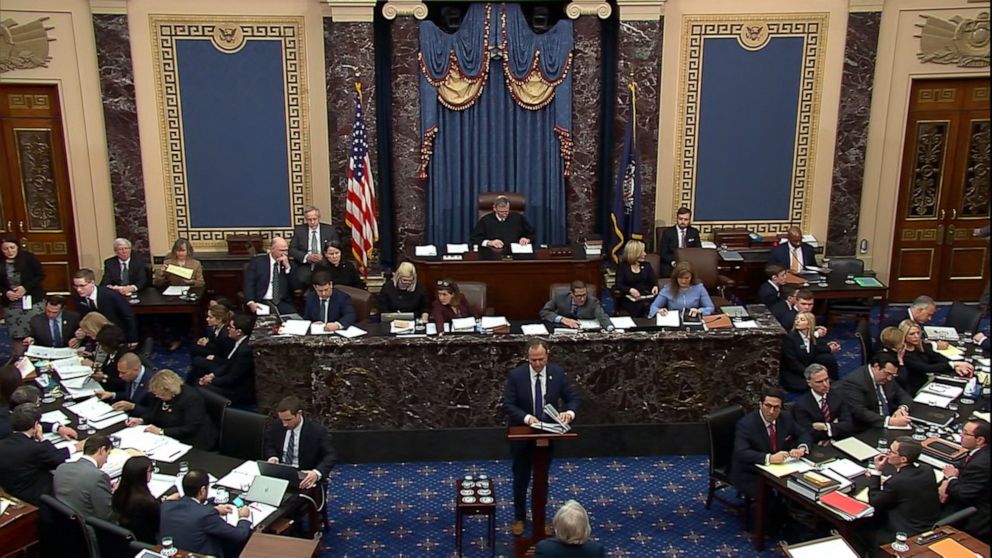
2:48 p.m. Schiff: 'The facts will come out'
Schiff emphasizes the same point as House managers wrapped up their arguments in favor of more witness testimony.
"Even over the course of this trial, we have seen so many additional facts come to light. The facts will come out. In all of their horror, they will come out," Schiff says.
"And there are more court documents and deadlines under the Freedom of Information Act, witnesses will tell their stories in future congressional hearings, and books, and in the media, this week has made that abundantly clear."
"And we will be asked why we didn't want to hear that information when we had the chance," he says, asking "what answer will we give?"
He argues that senators' decision on witnesses is even more important than the ultimate vote on whether the president is guilty or innocent.
"Rob this country of a fair trial and there can be no representation that the verdict has a clear meaning, how could it if the result is baked into the process? Assure the American people that whatever the result may be that they got a fair shake." he says.
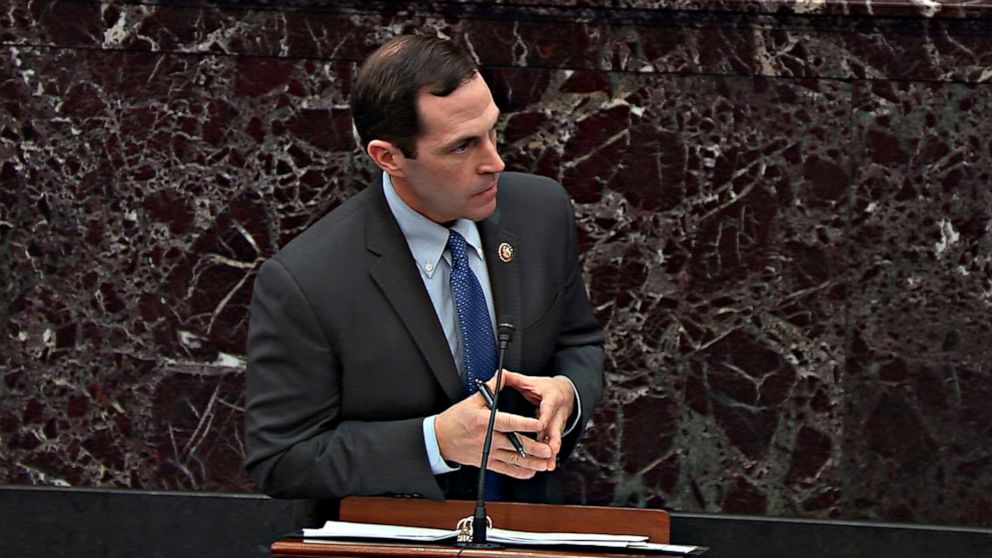
2:16 p.m. Crow: Bolton could address GOP concerns about Trump's state of mind
House manager Jason Crow argues that John Bolton could corroborate the testimony of other witnesses in the impeachment inquiry, some of whom Republicans have criticized for being cited without having firsthand knowledge of the president's state of mind.
"The truth will come out and it's continuing to," Crow says, citing The New York Times report this morning with additional information from Bolton's unpublished manuscript.
"The question here before this body is what do you want your place in history to be? Do you want your place in history to be let's hear the truth or that we don't want to hear it," Crow asks senators.
Crow extensively outlines the questions Bolton could answer for the Senate, in light of the defense presented by Trump's lawyers.
"The president has publicly lashed out in recent days against Ambassador Bolton," Crow says. "He says that what Ambassador Bolton is saying is nasty and untrue. But denials in 280 characters is not the same as testimony under oath."
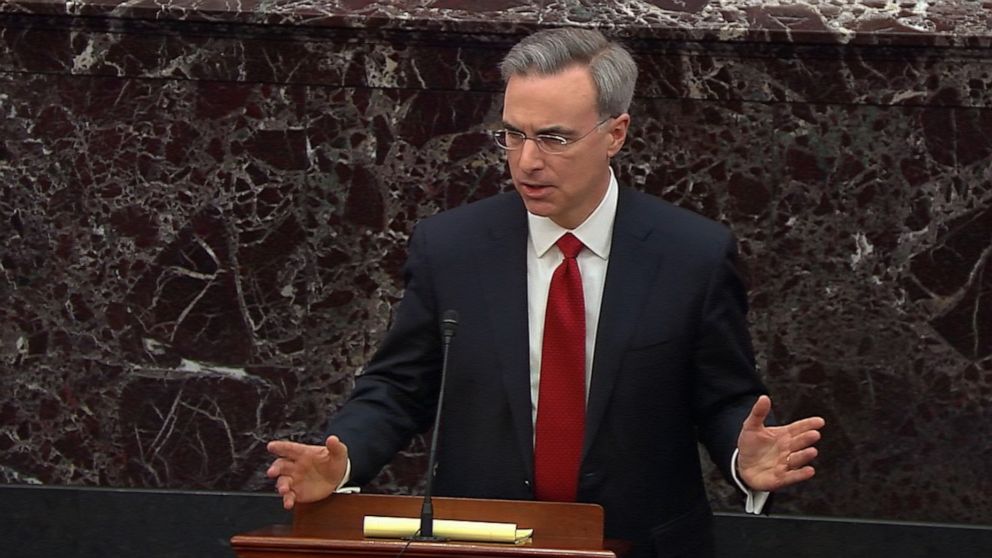
2:08 p.m. Schiff notes White House counsel Cipollone mentioned in Bolton report
-- From ABC News' Ben Siegel:
House Democrats on Friday began the trial by continuing what is likely to be a fruitless push for witnesses, repeatedly targeting White House counsel Pat Cipollone and the rest of Trump's legal team in light of the New York Times report that claimed he was present for a conversation between the president and John Bolton about the Ukraine pressure campaign.
"You will recall Mr. Cipollone suggesting that the House managers were concealing facts from this body. He said, 'All the facts should come out,'" manager Adam Schiff said. "Well there's a new fact which indicates that Mr. Cipollone was among those who are in the loop."
"The facts will come out, and they will continue to come out," he continued. "The question before you today is whether they will come out in time for you to make a complete and informed judgment."
Rep. Sylvia Garcia, D-Texas, played a clip of Cipollone's remarks a few minutes later.
"We are not the ones hiding the facts," she said.
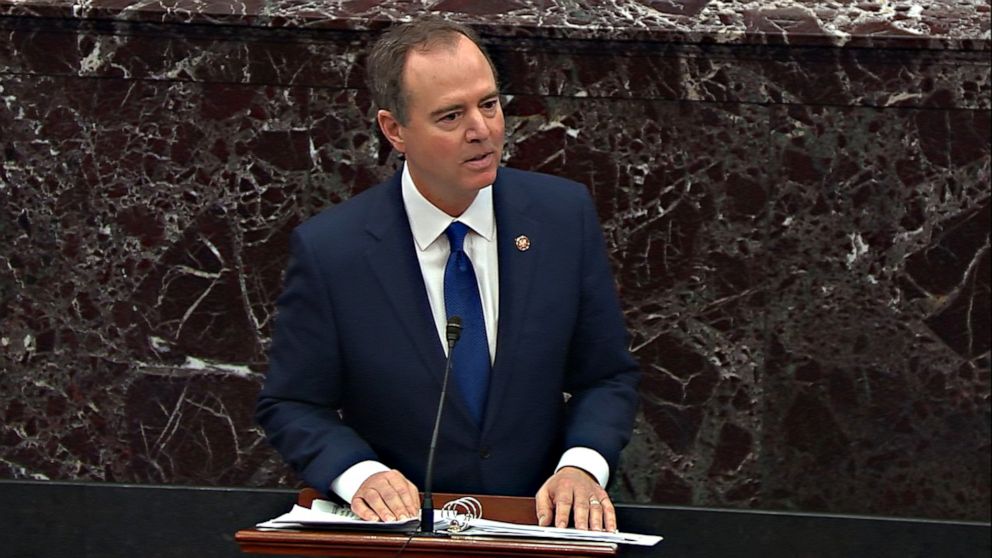
1:24: New Bolton book report lands like bombshell as witness debate begins
As he opens the debate over witnesses, lead House Manager Adam Schiff quickly brings up a new report in The New York Times referencing more of the manuscript of former national security adviser John Bolton's book.
Bolton is one of the key witnesses Democrats are demanding he heard.
The report says Bolton writes in his manuscript that Trump instructed him at a May 2019 meeting to help Trump's personal lawyer, Rudy Giuliani, set up a meeting with Ukraine's President Volodymyr Zelenskiy. The account says acting White House Chief of Staff Mick Mulvaney and White House counsel Pat Cipollone -- who is leading the president's defense on the Senate floor - were also present.
The White House and Giuliani deny the conversations described in the Times report. ABC News has not independently reviewed Bolton's manuscript.
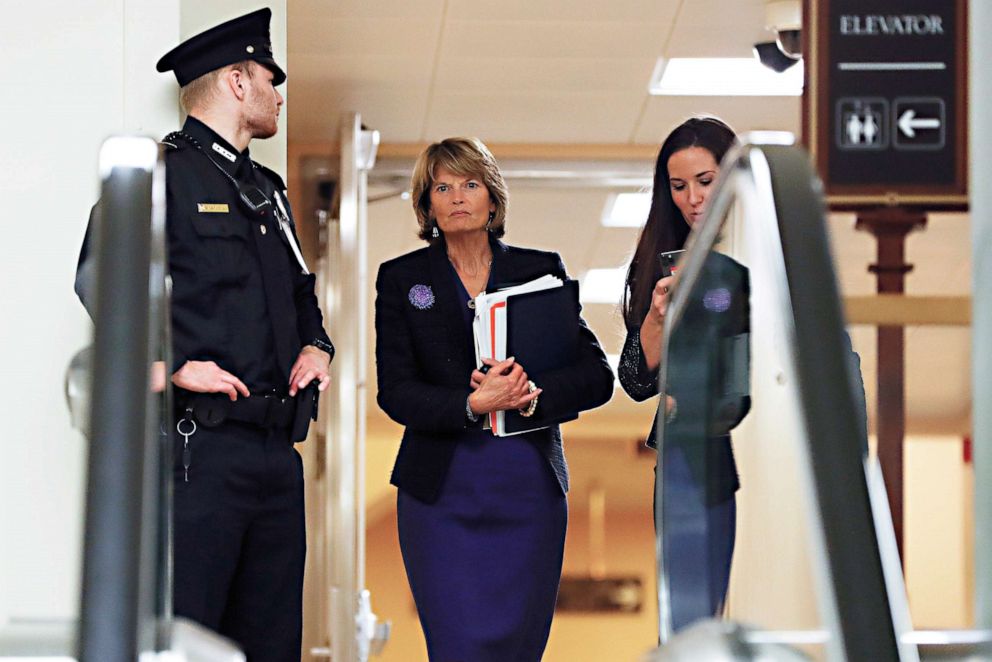
1:17 p.m. Murkowski announces she's a 'no' on witnesses'
As Friday's Senate trial session is getting underway, Sen. Lisa Murkowski announces she will vote against having the Senate allow new witnesses.
Her statement is below:
“I worked for a fair, honest, and transparent process, modeled after the Clinton trial, to provide ample time for both sides to present their cases, ask thoughtful questions, and determine whether we need more."
“The House chose to send articles of impeachment that are rushed and flawed. I carefully considered the need for additional witnesses and documents, to cure the shortcomings of its process, but ultimately decided that I will vote against considering motions to subpoena.
“Given the partisan nature of this impeachment from the very beginning and throughout, I have come to the conclusion that there will be no fair trial in the Senate. I don’t believe the continuation of this process will change anything. It is sad for me to admit that, as an institution, the Congress has failed.
“It has also become clear some of my colleagues intend to further politicize this process, and drag the Supreme Court into the fray, while attacking the Chief Justice. I will not stand for nor support that effort. We have already degraded this institution for partisan political benefit, and I will not enable those who wish to pull down another.
“We are sadly at a low point of division in this country.”
That word comes as The New York Times reports new excerpts from former national security adviser John Bolton's new book. According to the account, Trump instructed Bolton in May to help the president's personal lawyer, Rudy Giuliani, set up a meeting with Ukraine's President Zelenskiy. That would be two months before Trump's controversial July 25 phone call.
--ABC News' Trish Turner
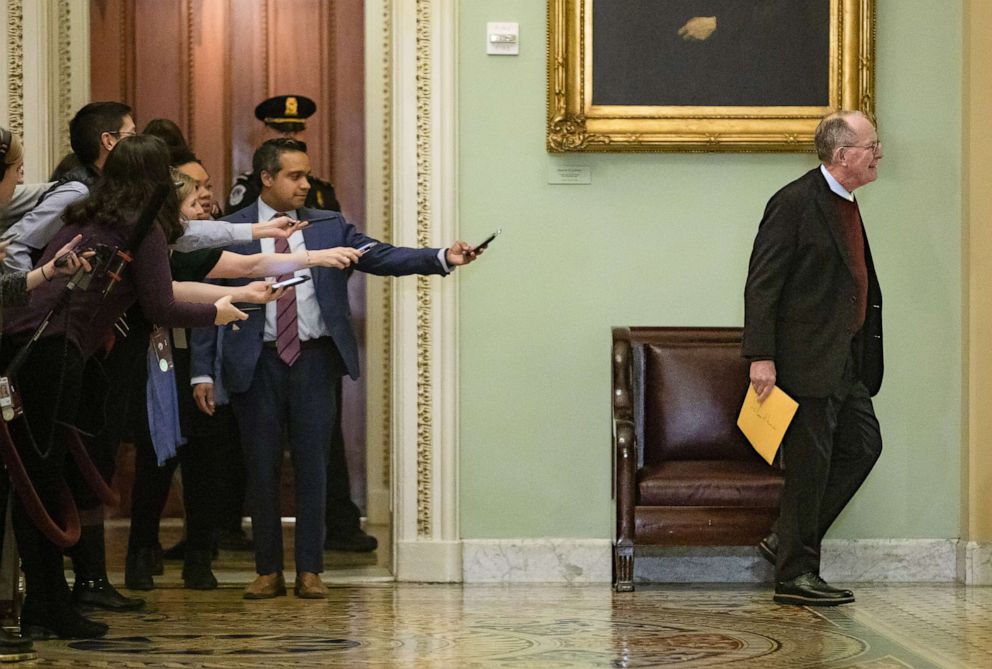
11:50 a.m. Alexander: Concerned about Senate as institution
ABC News' Devin Dwyer reports from Capitol Hill:
GOP Sen. Lamar Alexander says he was most swayed by concerns for the institution of the Senate in making his decision he announced last night to vote against witnesses.
The founders said there “should never be a partisan impeachment,” he tells me. “I was concerned about the Senate as an institution being created as a weapon of perpetual impeachment.”
Should a censure be on the table?
“I don’t see a need for that. This is an inappropriate act by a president,' he says. "The remedy for that is the election. The American people starting on Monday on Iowa can say what they think about it. They can take the phone call with Ukraine and add it to the good economy and whatever they think of the president behavior and decide between him or Elizabeth Warren.”
Alexander has not yet heard from Trump. He says the last time they spoke was in December.
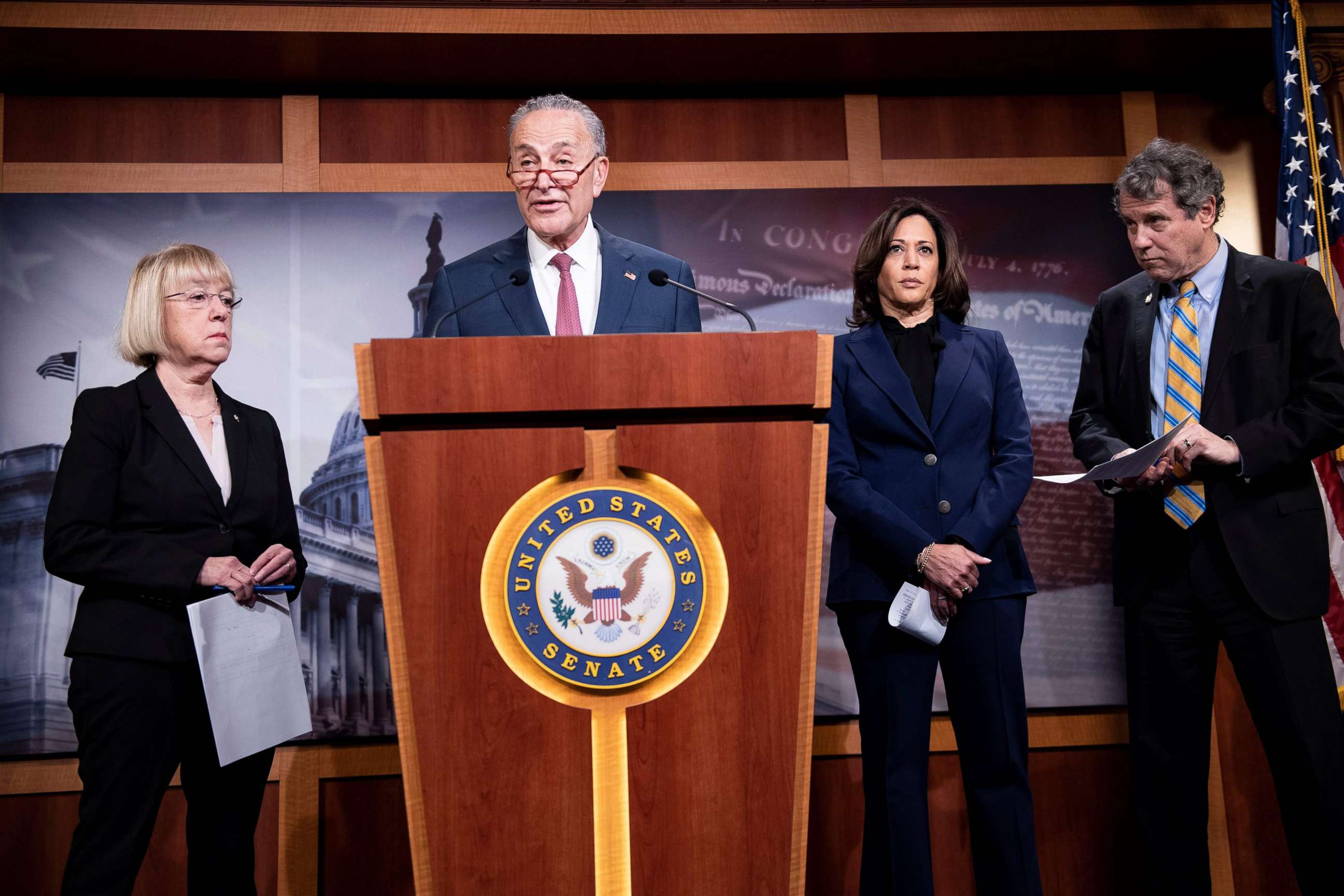
11:15 a.m. Schumer: 'The president's acquittal will be meaningless'
Minority Leader Chuck Schumer, at a morning news conference, says, "the result of today's vote is still an open question" but he and other Democrats seemed resigned to losing the battle.
"The president's acquittal will be meaningless," he says, "because it will be the result of a sham trial."
Schumer said "there will be "a permanent asterisk next to the acquittal of President Trump -- written in permanent ink."
"Every Republican who voted to hide the truth in an impeachment trial of the president" will have to answer for that, he says. "The truth -- the truth -- will come out."
"Republican senators who decide to go against the will of the people will have to reckon with them," he says. "If my Republican colleagues refuse to even consider witnesses and documents in this trial, this country is headed towards the greatest cover-up since Watergate."
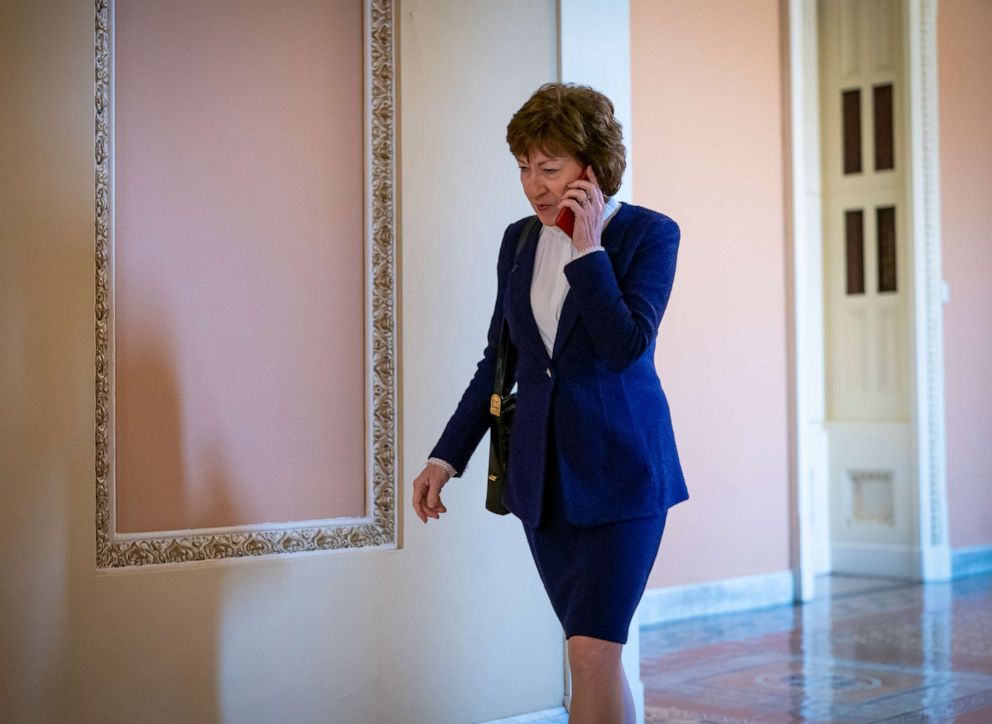
From earlier today:
Besides Alexander and Murkowski, the two other moderate Republicans Democrats had set their hopes on -- Sen. Mitt Romney of Utah and Sen. Susan Collins of Maine -- both broke with their party late Thursday, issuing statements in support of hearing new testimony. But without four Republicans joining Democrats, their votes likely won’t make a difference.
Chief Justice John Roberts remains the wild card. As the presiding officer, essentially assuming the ceremonial role of the vice president, he could -- in theory -- break a tie vote and Democrats are pushing for him to get more involved, but that seems unlikely.
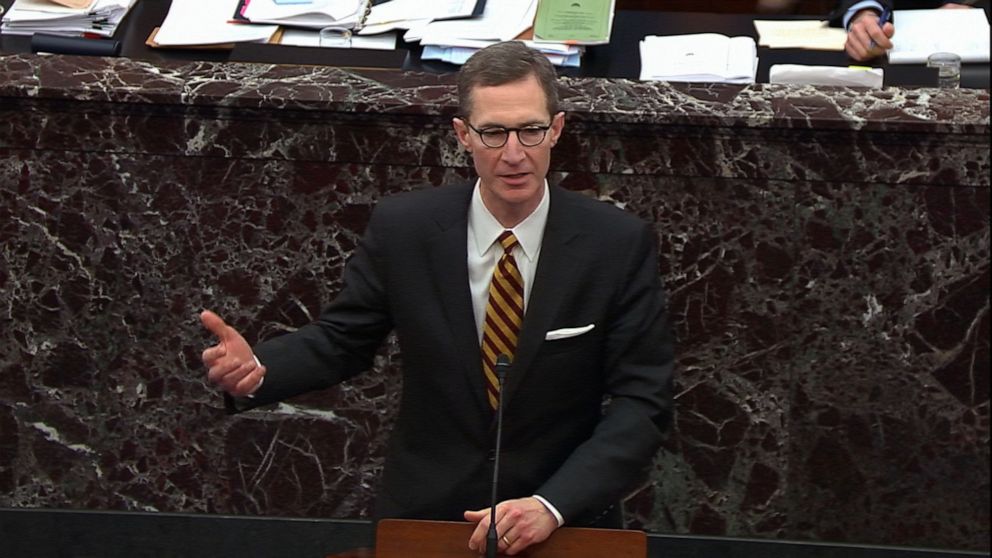
Senators raised the issue of adding witness testimony to the trial several times in their questions for the House managers and the White House defense counsel.
At one point late Thursday at the Senate trial, Sen. Murkowski, essentially asked Trump’s lawyers point-blank: Why not call John Bolton to testify?
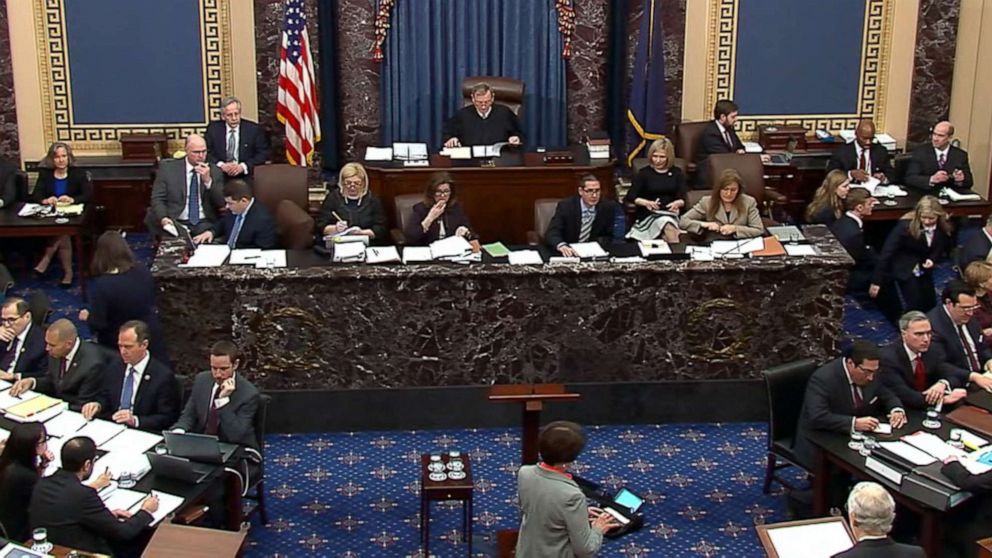
"I think the primary consideration here is to understand that the House could have pursued Ambassador Bolton," White House Deputy Counsel Patrick Philbin responded, noting that the House chose not to subpoena Bolton.
He said admitting Bolton would set a lower standard of what the House is required to do in pursuing impeachment, sending a message that, "you don't have to do all of that work before you get to this institution.''
"That's not the way that this chamber should allow impeachments to be presented to it," Philbin said.
ABC News' Mychael Schnell contributed to this report.